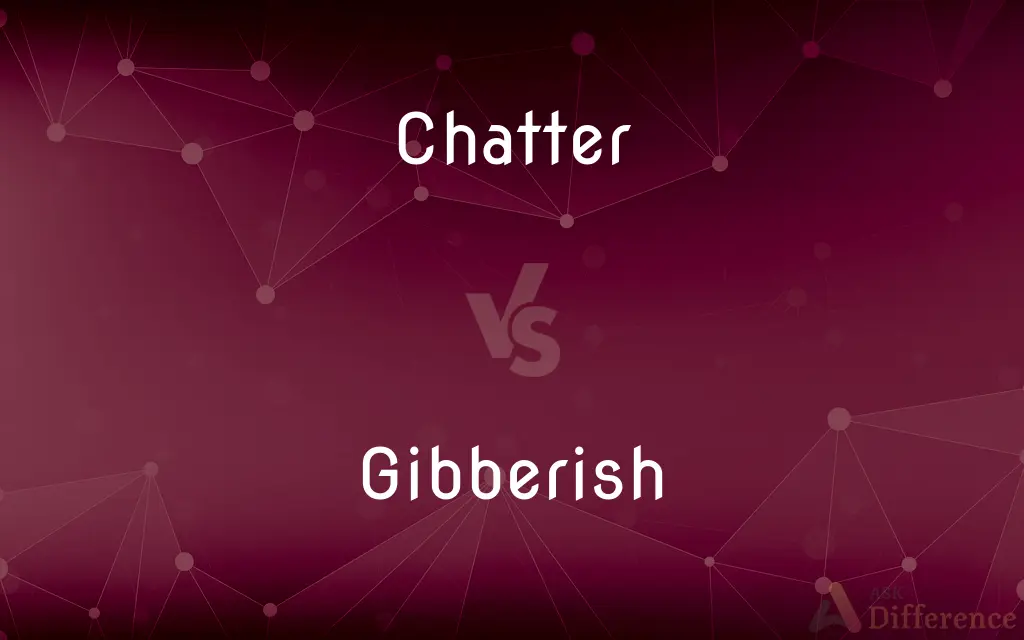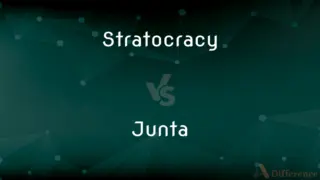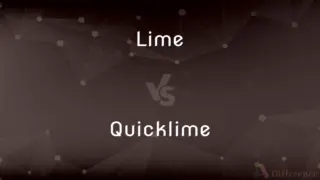Chatter vs. Gibberish — What's the Difference?
By Tayyaba Rehman & Urooj Arif — Updated on April 8, 2024
Chatter refers to continuous and often trivial talk, while gibberish denotes nonsensical, unintelligible language, highlighting a difference in coherence.

Difference Between Chatter and Gibberish
Table of Contents
ADVERTISEMENT
Key Differences
Chatter often implies a rapid, continuous flow of conversation that, despite being possibly trivial or superficial, remains understandable and coherent. On the other hand, gibberish is characterized by its lack of intelligibility, consisting of sounds or words that don't form coherent language and are often used to convey confusion or the absence of meaningful content.
In social contexts, chatter can serve to foster connections and maintain social bonds through light, casual conversation. It's the kind of talk you might hear at gatherings or among friends discussing varied topics of mutual interest. Gibberish, however, is rarely used in serious communication and might instead be found in playful settings, such as with children inventing their languages, or to humorously mimic speech without conveying actual information.
Chatter can also serve practical purposes, such as in workplaces where it helps to maintain a friendly atmosphere, even if the topics aren't always directly related to work. Gibberish, in contrast, serves no purpose in conveying meaningful information and is generally not productive in environments requiring clear communication, such as in professional or educational settings.
In literature and art, chatter is often used to depict everyday life and realism, providing insights into characters’ thoughts and social dynamics. Conversely, gibberish may be employed creatively to challenge perceptions of language and communication or to represent a break from conventional narrative forms.
Technologically, chatter refers to background noise or irrelevant data in communication systems that can interfere with the signal but is still based on actual data or conversation. Gibberish, in technological terms, might refer to corrupted data or encryption outputs that are not meant to be decoded into meaningful information without the requisite key or context.
ADVERTISEMENT
Comparison Chart
Definition
Continuous, often trivial talk
Nonsensical, unintelligible language
Coherence
Coherent and understandable
Lacks intelligibility
Purpose
Social bonding, casual conversation
Playful use, no intent to convey real information
Context
Social gatherings, workplace
Playful settings, mocking speech
Contribution to Communication
Maintains social bonds, fosters connections
Generally non-contributory to meaningful dialogue
Usage in Literature
Depicts everyday life, realism
Challenges conventional narrative, represents chaos
Technological Meaning
Background noise, irrelevant data
Corrupted data, encrypted content not meant for direct interpretation
Compare with Definitions
Chatter
Continuous light talk among people.
The chatter in the café created a warm, inviting atmosphere.
Gibberish
Random, unintelligible sounds.
The baby’s gibberish was adorable but impossible to understand.
Chatter
Informal communication.
Social media platforms are filled with endless chatter about daily life.
Gibberish
Speech or writing that is nonsensical.
He responded in gibberish, leaving everyone confused.
Chatter
Background conversation noise.
The constant chatter during the flight made it hard to concentrate.
Gibberish
Language used in jest to mimic speaking.
They spoke in gibberish to keep their conversation private.
Chatter
Rapid talk with little pause.
The children’s excited chatter filled the room as they discussed their plans.
Gibberish
Corrupted or meaningless text.
The document was full of gibberish after the file became corrupted.
Chatter
Casual exchange of information.
Office chatter helps employees bond over non-work-related topics.
Gibberish
Useless or incomprehensible information.
The instructions came out as gibberish, offering no help.
Chatter
Talk informally about unimportant matters
She was chattering about her holiday
Gibberish
Gibberish, also called jibber-jabber or gobbledygook, is speech that is (or appears to be) nonsense. It may include speech sounds that are not actual words, or language games and specialized jargon that seems nonsensical to outsiders."Gibberish" is also used as an imprecation to denigrate or tar ideas or opinions the user disagrees with or finds irksome, a rough equivalent of "nonsense", "folderol", or "claptrap".
Chatter
Informal talk
He was full of inconsequential but amusing chatter
Gibberish
Unintelligible or meaningless speech or writing; nonsense
He talks gibberish
Chatter
A series of short, quick high-pitched sounds
The starlings' constant chatter
Gibberish
Unintelligible or nonsensical talk or writing.
Chatter
To talk rapidly, incessantly, and on trivial subjects; jabber.
Gibberish
Highly technical or esoteric language.
Chatter
To utter a rapid series of short, inarticulate, speechlike sounds
Birds chattering in the trees.
Gibberish
Unnecessarily pretentious or vague language.
Chatter
To click quickly and repeatedly
Our teeth chattered from the cold.
Gibberish
Speech or writing that is unintelligible, incoherent or meaningless.
Chatter
To vibrate or rattle while in operation
A power drill will chatter if the bit is loose.
Gibberish
Needlessly obscure or overly technical language.
Chatter
To utter in a rapid, usually thoughtless way
Chattered a long reply.
Gibberish
(uncountable) A language game, comparable to pig Latin, in which one inserts a nonsense syllable before the first vowel in each syllable of a word.
Chatter
Idle, trivial talk.
Gibberish
Unintelligible, incoherent or meaningless
Chatter
Communication, such as email and phone calls, between people who are involved in terrorism or espionage, as monitored by a government agency.
Gibberish
Rapid and inarticulate talk; unintelligible language; unmeaning words.
He, like a gypsy, oftentimes would go;All kinds of gibberish he had learnt to know.
Such gibberish as children may be heard amusing themselves with.
Chatter
The sharp, rapid sounds made by some birds and animals.
Gibberish
Incomprehensible, obscure, or pretentious technical talk or writing; excessively obscure jargon.
Chatter
A series of quick rattling or clicking sounds.
Gibberish
Unmeaning; as, gibberish language.
Chatter
Talk, especially meaningless or unimportant talk.
Gibberish
Unintelligible talking
Chatter
The sound of talking.
Chatter
The vocalisations of a Eurasian magpie, Pica pica.
Chatter
The vocalisations of various birds or other animals.
Chatter
An intermittent noise, as from vibration.
Proper brake adjustment will help to reduce the chatter.
Chatter
(uncountable) In national security, the degree of communication between suspect groups and individuals, used to gauge the degree of expected terrorist activity.
The NSA is concerned about increased chatter between known terror groups.
Chatter
(uncountable) The situation where a drill or similar tool vibrates and tears the material rather than cutting it cleanly.
Chatter
One who chats.
Chatter
(Internet) A user of chat rooms.
Chatter
(intransitive) To talk idly.
They knitted and chattered the whole time.
Chatter
To make a noise by rapid collisions.
He was so cold that his teeth were chattering.
Chatter
To utter sounds which somewhat resemble language, but are inarticulate and indistinct.
Chatter
To utter sounds which somewhat resemble language, but are inarticulate and indistinct.
The jaw makes answer, as the magpie chatters.
Chatter
To talk idly, carelessly, or with undue rapidity; to jabber; to prate.
To tame a shrew, and charm her chattering tongue.
Chatter
To make a noise by rapid collisions.
With chattering teeth, and bristling hair upright.
Chatter
To utter rapidly, idly, or indistinctly.
Begin his witless note apace to chatter.
Chatter
Sounds like those of a magpie or monkey; idle talk; rapid, thoughtless talk; jabber; prattle.
Your words are but idle and empty chatter.
Chatter
Noise made by collision of the teeth, as in shivering.
Chatter
Noisy talk
Chatter
The rapid series of noises made by the parts of a machine
Chatter
The high-pitched continuing noise made by animals (birds or monkeys)
Chatter
Click repeatedly or uncontrollably;
Chattering teeth
Chatter
Cut unevenly with a chattering tool
Chatter
Talk socially without exchanging too much information;
The men were sitting in the cafe and shooting the breeze
Chatter
Speak (about unimportant matters) rapidly and incessantly
Chatter
Make noise as if chattering away;
The magpies were chattering in the trees
Common Curiosities
Can chatter ever be considered gibberish?
While chatter can be trivial, it remains coherent and understandable, differing from gibberish, which lacks any intelligible structure.
What is the main difference between chatter and gibberish?
Chatter is continuous and often trivial talk that is coherent and understandable, while gibberish refers to nonsensical and unintelligible language.
What role does gibberish play in child development?
Gibberish can be a normal part of language development in children, allowing them to experiment with sounds and patterns of speech.
How do chatter and gibberish affect communication?
Chatter can foster social bonds and maintain a friendly atmosphere, whereas gibberish generally does not contribute to meaningful dialogue.
Why do people engage in chatter?
People engage in chatter for social bonding, to pass time, and to maintain casual connections in both personal and professional settings.
Can gibberish have any meaning?
While gibberish is characterized by its lack of intelligibility, it can convey emotions or playful intent in certain contexts.
How is chatter viewed in professional settings?
In moderation, chatter in professional settings can help build a friendly work environment; excessive chatter, however, might be seen as distracting.
Are there any positive uses of gibberish?
Gibberish can be used creatively in literature and art to challenge perceptions of language and communication, or playfully among children and adults.
Is gibberish ever used intentionally in communication?
Yes, gibberish can be used intentionally for playful purposes, creative expression, or to mock or mimic unintelligible speech.
Is it possible to translate gibberish?
Since gibberish lacks coherent structure, it cannot be translated in the traditional sense but can sometimes be interpreted based on context or playful intent.
Share Your Discovery

Previous Comparison
Stratocracy vs. Junta
Next Comparison
Lime vs. QuicklimeAuthor Spotlight
Written by
Tayyaba RehmanTayyaba Rehman is a distinguished writer, currently serving as a primary contributor to askdifference.com. As a researcher in semantics and etymology, Tayyaba's passion for the complexity of languages and their distinctions has found a perfect home on the platform. Tayyaba delves into the intricacies of language, distinguishing between commonly confused words and phrases, thereby providing clarity for readers worldwide.
Co-written by
Urooj ArifUrooj is a skilled content writer at Ask Difference, known for her exceptional ability to simplify complex topics into engaging and informative content. With a passion for research and a flair for clear, concise writing, she consistently delivers articles that resonate with our diverse audience.














































